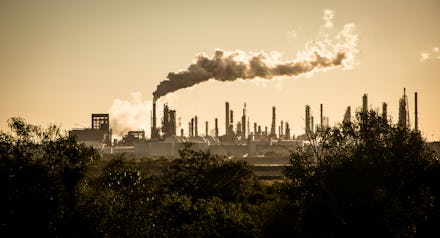A new report says climate change is only second to nuclear war in terms of threat to human life

A retired admiral and former chief of the Australian Defense Force has endorsed a new climate change report that outlines the serious security risks of dismissing climate change as a threat. This report, released by the National Centre for Climate Restoration (also known as Breakthrough), warns that climate change could threaten the national security of nations on a scale similar to war, and that a "largely uninhabitable Earth [will lead] to the breakdown of nations and the international order.”
The paper describes a model scenario where current levels of environmental damage continue from 2020 into 2050. In this scenario, global policy-makers fail to address climate change in an effective manner, and the Earth's temperature eventually rises by 3°C (37.4°F) at a rate predicted by the Intergovernmental Panel on Climate Change (IPCC). The temperature change causes an increase in lethal heat conditions all over the world, affecting the ecology and people most vulnerable to hot environments.
This means, by 2050, there could be an increase in North American wildfires, heatwaves, drought, and unusual flooding in areas due to higher water levels. On the flip side, monsoons in Asia might fail to provide enough water to the region. The loss of the Himalayan ice sheet will cause water levels in Asia's large rivers to drastically drop. Rainfall in Mexico and Central America could halve. Some El Niño conditions would become semi-permanent throughout the world, and the fertile lands within the southwestern United States could be less viable for agriculture. The paper also warned of large-scale human migration due to the collapse of communities most affected by climate change, such as areas in Southeast Asia and tropical South America. Extreme weather conditions, water scarcity, and deadly heat can force billions of residents to find new homes in other areas. Climate change would also cause a decrease in food production all over the Earth as the number of farmable lands grows smaller.
Retired Admiral Chris Barrie, who penned the foreword for the report, cautioned that these changes will force humans into a desperate situation that can place immense pressure on governments and create civil unrest as the trust in the leadership of a nation falls to low levels. Barrie wrote of changes already happening, such as "young women speak[ing] of their decisions to not have children" and the low morale of climate scientists who fear the worst to come. "[They] turn towards thinking more about family and relocation to 'safer' places, rather than working on more research."
Without drastic action akin to wartime mobilization, the future of mankind is grim. "[A]fter nuclear war," stated Barrie, "human-induced global warming is the greatest threat to human life on the planet."
Breakthrough noted that the report is a 'worst case scenario' that might come to pass if international government leaders continue to ignore climate change. A climate science lecturer, Andrew King, reviewed the paper and told CNN the scenario was completely believable, although he said the scale of the effects is still in the air. "It's the details that we need to pin down," he stated.
The authors of the paper imply there's no time to sit around and figure out the fine details. They warn that their findings could be underestimating the scale of devastation since global warming is such a large-scale event that goes beyond what the human mind can conceive. In order to prevent hitting the "point of no return" by 2050, analysts, researchers, and government leaders need to prioritize fighting climate change the same way they would prioritize preparing for war.
"The national security sector has unrivaled experience and capacity in such mobilization," stated the paper. National security advocates and analysts "can play a unique role in [climate change policy] development and implementation, as well as educating policymakers of the existential security risks in failing to do so."